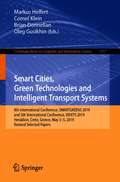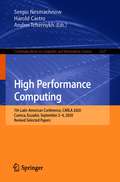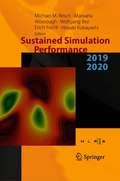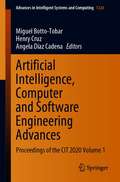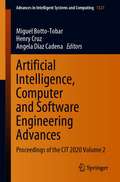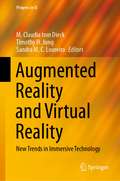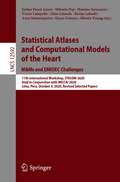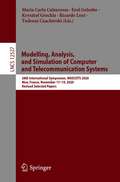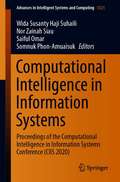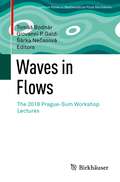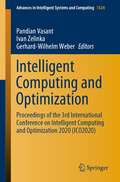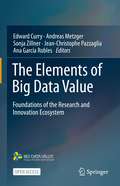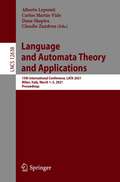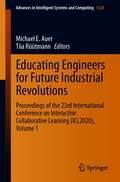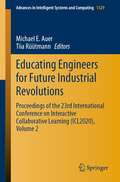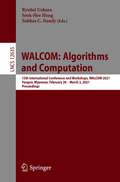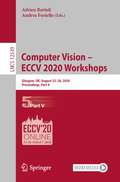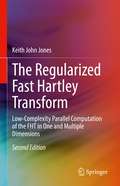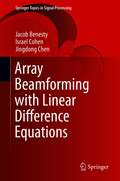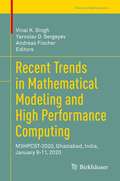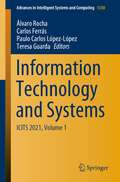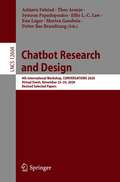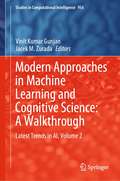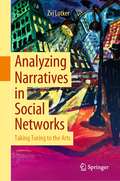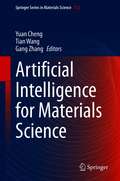- Table View
- List View
Smart Cities, Green Technologies and Intelligent Transport Systems: 8th International Conference, SMARTGREENS 2019, and 5th International Conference, VEHITS 2019, Heraklion, Crete, Greece, May 3–5, 2019, Revised Selected Papers (Communications in Computer and Information Science #1217)
by Markus Helfert Brian Donnellan Cornel Klein Oleg GusikhinThis book includes extended and revised selected papers from the 8th International Conference on Smart Cities and Green ICT Systems, SMARTGREENS 2019, and the 5th International Conference on Vehicle Technology and Intelligent Transport Systems, VEHITS 2019, held in Heraklion, Crete, Greece, in May 2019. The 17 full papers presented during SMARTGREENS and VEHITS 2019 were carefully reviewed and selected from the 134 submissions. The papers present research on advances and applications in the fiels of smart cities, green information and communication technologies, sustainability, energy aware systems and technologies, vehicle technology and intelligent transport systems.
High Performance Computing: 7th Latin American Conference, CARLA 2020, Cuenca, Ecuador, September 2–4, 2020, Revised Selected Papers (Communications in Computer and Information Science #1327)
by Sergio Nesmachnow Harold Castro Andrei TchernykhThis book constitutes revised selected papers of the 7th Latin American High Performance Computing Conference, CARLA 2020, held in Cuenca, Ecuador, in September 2020. Due to the COVID-19 pandemic the conference was held in a virtual mode. The 15 revised full papers presented were carefully reviewed and selected out of 36 submissions. The papers included in this book are organized according to the topics on High Performance Computing Applications; High Performance Computing and Artificial Intelligence.
Sustained Simulation Performance 2019 and 2020: Proceedings of the Joint Workshop on Sustained Simulation Performance, University of Stuttgart (HLRS) and Tohoku University, 2019 and 2020
by Michael M. Resch Manuela Wossough Wolfgang Bez Erich Focht Hiroaki KobayashiThis book presents the state of the art in High Performance Computing on modern supercomputer architectures. It addresses trends in hardware and software development in general. The contributions cover a broad range of topics, from performance evaluations in context with power efficiency to Computational Fluid Dynamics and High Performance Data Analytics. In addition, they explore new topics like the use of High Performance Computers in the field of Artificial Intelligence and Machine Learning. All contributions are based on selected papers presented at the 30th Workshop on Sustained Simulation Performance (WSSP) held at the High Performance Computing Center, University of Stuttgart, Germany in October 2019 and on the papers for the planned Workshop on Sustained Simulation Performance in March 2020, which could not take place due to the Covid-19 pandemic.
Artificial Intelligence, Computer and Software Engineering Advances: Proceedings of the CIT 2020 Volume 1 (Advances in Intelligent Systems and Computing #1326)
by Miguel Botto-Tobar Henry Cruz Angela Díaz CadenaThis book constitutes the proceedings of the XV Multidisciplinary International Congress on Science and Technology (CIT 2020), held in Quito, Ecuador, on 26–30 October 2020, proudly organized by Universidad de las Fuerzas Armadas ESPE in collaboration with GDEON. CIT is an international event with a multidisciplinary approach that promotes the dissemination of advances in Science and Technology research through the presentation of keynote conferences. In CIT, theoretical, technical, or application works that are research products are presented to discuss and debate ideas, experiences, and challenges. Presenting high-quality, peer-reviewed papers, the book discusses the following topics:Artificial IntelligenceComputational ModelingData CommunicationsDefense EngineeringInnovation, Technology, and SocietyManaging Technology & Sustained Innovation, and Business DevelopmentModern Vehicle TechnologySecurity and CryptographySoftware Engineering
Artificial Intelligence, Computer and Software Engineering Advances: Proceedings of the CIT 2020 Volume 2 (Advances in Intelligent Systems and Computing #1327)
by Miguel Botto-Tobar Henry Cruz Angela Díaz CadenaThis book constitutes the proceedings of the XV Multidisciplinary International Congress on Science and Technology (CIT 2020), held in Quito, Ecuador, on 26–30 October 2020, proudly organized by Universidad de las Fuerzas Armadas ESPE in collaboration with GDEON. CIT is an international event with a multidisciplinary approach that promotes the dissemination of advances in Science and Technology research through the presentation of keynote conferences. In CIT, theoretical, technical, or application works that are research products are presented to discuss and debate ideas, experiences, and challenges. Presenting high-quality, peer-reviewed papers, the book discusses the following topics:Artificial IntelligenceComputational ModelingData CommunicationsDefense EngineeringInnovation, Technology, and SocietyManaging Technology & Sustained Innovation, and Business DevelopmentModern Vehicle TechnologySecurity and CryptographySoftware Engineering
Augmented Reality and Virtual Reality: New Trends in Immersive Technology (Progress in IS)
by M. Claudia tom Dieck Timothy H. Jung Sandra M. C. LoureiroThis book features the latest research in the area of immersive technologies, presented at the 6th International Augmented Reality and Virtual Reality Conference, held in online in 2020. Bridging the gap between academia and industry, it presents the state of the art in augmented reality (AR) and virtual reality (VR) technologies and their applications in various industries such as marketing, education, health care, tourism, events, fashion, entertainment, retail and the gaming industry.The book is a collection of research papers by prominent AR and VR scholars from around the globe. Covering the most significant topics in the field of augmented and virtual reality and providing the latest findings, it is of interest to academics and practitioners alike.
Statistical Atlases and Computational Models of the Heart. M&Ms and EMIDEC Challenges: 11th International Workshop, STACOM 2020, Held in Conjunction with MICCAI 2020, Lima, Peru, October 4, 2020, Revised Selected Papers (Lecture Notes in Computer Science #12592)
by Esther Puyol Anton Mihaela Pop Maxime Sermesant Victor Campello Alain Lalande Karim Lekadir Avan Suinesiaputra Oscar Camara Alistair YoungThis book constitutes the proceedings of the 11th International Workshop on Statistical Atlases and Computational Models of the Heart, STACOM 2020, as well as two challenges: M&Ms - The Multi-Centre, Multi-Vendor, Multi-Disease Segmentation Challenge, and EMIDEC - Automatic Evaluation of Myocardial Infarction from Delayed-Enhancement Cardiac MRI Challenge. The 43 full papers included in this volume were carefully reviewed and selected from 70 submissions. They deal with cardiac imaging and image processing, machine learning applied to cardiac imaging and image analysis, atlas construction, artificial intelligence, statistical modelling of cardiac function across different patient populations, cardiac computational physiology, model customization, atlas based functional analysis, ontological schemata for data and results, integrated functional and structural analyses, as well as the pre-clinical and clinical applicability of these methods.
Modelling, Analysis, and Simulation of Computer and Telecommunication Systems: 28th International Symposium, MASCOTS 2020, Nice, France, November 17–19, 2020, Revised Selected Papers (Lecture Notes in Computer Science #12527)
by Maria Carla Calzarossa Erol Gelenbe Krysztof Grochla Ricardo Lent Tadeusz CzachórskiThis book constitutes the post proceedings of the 28th International Symposium on Modelling, Analysis, and Simulation of Computer and Telecommunication Systems, MASCOTS 2020, held online -due to COVID -19- in Nice, France, in November 2020. The 17 full papers presented were carefully reviewed and selected from 124 submissions. The symposium collected the most relevant papers describing state-of-the-art research in the areas of the performance evaluation of computer systems and networks as well as in related areas.
Computational Intelligence in Information Systems: Proceedings of the Computational Intelligence in Information Systems Conference (CIIS 2020) (Advances in Intelligent Systems and Computing #1321)
by Wida Susanty Haji Suhaili Nor Zainah Siau Saiful Omar Somnuk Phon-AmuaisukThis book constitutes the Proceeding of the Computational Intelligence in Information Systems conference (CIIS 2020), held in Brunei, January 25–27, 2021. The CIIS conference provides a platform for researchers to exchange the latest ideas and to present new research advances in general areas related to computational intelligence and its applications. The 23 revised papers presented in this book have been carefully selected from 55 submissions.
Waves in Flows: The 2018 Prague-Sum Workshop Lectures (Advances in Mathematical Fluid Mechanics)
by Tomáš Bodnár Giovanni P. Galdi Šárka NečasováThis volume explores a range of recent advances in mathematical fluid mechanics, covering theoretical topics and numerical methods. Chapters are based on the lectures given at a workshop in the summer school Waves in Flows, held in Prague from August 27-31, 2018. A broad overview of cutting edge research is presented, with a focus on mathematical modeling and numerical simulations. Readers will find a thorough analysis of numerous state-of-the-art developments presented by leading experts in their respective fields. Specific topics covered include:ChemorepulsionCompressible Navier-Stokes systemsNewtonian fluidsFluid-structure interactions Waves in Flows: The 2018 Prague-Sum Workshop Lectures will appeal to post-doctoral students and scientists whose work involves fluid mechanics.
Intelligent Computing and Optimization: Proceedings of the 3rd International Conference on Intelligent Computing and Optimization 2020 (ICO 2020) (Advances in Intelligent Systems and Computing #1324)
by Pandian Vasant Ivan Zelinka Gerhard-Wilhelm WeberThird edition of International Conference on Intelligent Computing and Optimization and as a premium fruit, this book, pursue to gather research leaders, experts and scientists on Intelligent Computing and Optimization to share knowledge, experience and current research achievements. Conference and book provide a unique opportunity for the global community to interact and share novel research results, explorations and innovations among colleagues and friends. This book is published by SPRINGER, Advances in Intelligent Systems and Computing. Ca. 100 authors submitted full papers to ICO’2020. That global representation demonstrates the growing interest of the research community here. The book covers innovative and creative research on sustainability, smart cities, meta-heuristics optimization, cyber-security, block chain, big data analytics, IoTs, renewable energy, artificial intelligence, Industry 4.0, modeling and simulation. We editors thank all authors and reviewers for their important service. Best high-quality papers have been selected by the International PC for our premium series with SPRINGER.
The Elements of Big Data Value: Foundations of the Research and Innovation Ecosystem
by Edward Curry Andreas Metzger Sonja Zillner Jean-Christophe Pazzaglia Ana García RoblesThis open access book presents the foundations of the Big Data research and innovation ecosystem and the associated enablers that facilitate delivering value from data for business and society. It provides insights into the key elements for research and innovation, technical architectures, business models, skills, and best practices to support the creation of data-driven solutions and organizations. The book is a compilation of selected high-quality chapters covering best practices, technologies, experiences, and practical recommendations on research and innovation for big data. The contributions are grouped into four parts: · Part I: Ecosystem Elements of Big Data Value focuses on establishing the big data value ecosystem using a holistic approach to make it attractive and valuable to all stakeholders. · Part II: Research and Innovation Elements of Big Data Value details the key technical and capability challenges to be addressed for delivering big data value. · Part III: Business, Policy, and Societal Elements of Big Data Value investigates the need to make more efficient use of big data and understanding that data is an asset that has significant potential for the economy and society. · Part IV: Emerging Elements of Big Data Value explores the critical elements to maximizing the future potential of big data value. Overall, readers are provided with insights which can support them in creating data-driven solutions, organizations, and productive data ecosystems. The material represents the results of a collective effort undertaken by the European data community as part of the Big Data Value Public-Private Partnership (PPP) between the European Commission and the Big Data Value Association (BDVA) to boost data-driven digital transformation.
Language and Automata Theory and Applications: 15th International Conference, LATA 2021, Milan, Italy, March 1–5, 2021, Proceedings (Lecture Notes in Computer Science #12638)
by Alberto Leporati Carlos Martín-Vide Dana Shapira Claudio ZandronThis book constitutes the proceedings of the 15th International Conference on Language and Automata Theory and Applications, LATA 2021, held in Milan, Italy, in March 2021. The 26 full papers presented in this volume were carefully reviewed and selected from 52 submissions. They were organized in topical sections named: algebraic structures; automata; complexity; learning; logics and languages; trees and graphs; and words and strings.
Educating Engineers for Future Industrial Revolutions: Proceedings of the 23rd International Conference on Interactive Collaborative Learning (ICL2020), Volume 1 (Advances in Intelligent Systems and Computing #1328)
by Michael E. Auer Tiia RüütmannThis book contains papers in the fields of collaborative learning, new learning models and applications, project-based learning, game-based education, educational virtual environments, computer-aided language learning (CALL) and teaching best practices.We are currently witnessing a significant transformation in the development of education and especially post-secondary education. To face these challenges, higher education has to find innovative ways to quickly respond to these new needs. There is also pressure by the new situation in regard to the Covid pandemic.These were the aims connected with the 23rd International Conference on Interactive Collaborative Learning (ICL2020), which was held online by University of Technology Tallinn, Estonia from 23 to 25 September 2020. Since its beginning in 1998, this conference is devoted to new approaches in learning with a focus on collaborative learning. Nowadays the ICL conferences are a forum of the exchange of relevant trends and research results as well as the presentation of practical experiences in Learning and Engineering Pedagogy. In this way, we try to bridge the gap between ‘pure’ scientific research and the everyday work of educators. Interested readership includes policymakers, academics, educators, researchers in pedagogy and learning theory, school teachers, learning industry, further and continuing education lecturers, etc.
Educating Engineers for Future Industrial Revolutions: Proceedings of the 23rd International Conference on Interactive Collaborative Learning (ICL2020), Volume 2 (Advances in Intelligent Systems and Computing #1329)
by Michael E. Auer Tiia RüütmannThis book contains papers in the fields of engineering pedagogy education, public–private partnership and entrepreneurship education, research in engineering pedagogy, evaluation and outcomes assessment, Internet of Things & online laboratories, IT & knowledge management in education and real-world experiences. We are currently witnessing a significant transformation in the development of education and especially post-secondary education. To face these challenges, higher education has to find innovative ways to quickly respond to these new needs. There is also pressure by the new situation in regard to the Covid pandemic. These were the aims connected with the 23rd International Conference on Interactive Collaborative Learning (ICL2020), which was held online by University of Technology Tallinn, Estonia from 23 to 25 September 2020. Since its beginning in 1998, this conference is devoted to new approaches in learning with a focus on collaborative learning. Nowadays the ICL conferences are a forum of the exchange of relevant trends and research results as well as the presentation of practical experiences in Learning and Engineering Pedagogy. In this way, we try to bridge the gap between ‘pure’ scientific research and the everyday work of educators. Interested readership includes policymakers, academics, educators, researchers in pedagogy and learning theory, school teachers, learning industry, further and continuing education lecturers, etc.
WALCOM: 15th International Conference and Workshops, WALCOM 2021, Yangon, Myanmar, February 28 – March 2, 2021, Proceedings (Lecture Notes in Computer Science #12635)
by Ryuhei Uehara Seok-Hee Hong Subhas C. NandyThis book constitutes the proceedings of the 15th International Conference on Algorithms and Computation, WALCOM 2021, which was planned to take place in Yangon, Myanmar in February/March 2021. The conference changed to an online format due to the COVID-19 pandemic. The 24 full papers included in this volume were carefully reviewed and selected from a total of 60 submissions. They cover diverseareas of algorithms and computation, such as approximation algorithms, algorithmic graph theory and combinatorics, combinatorial algorithms, combinatorial optimization, computational biology, computational complexity, computational geometry, discrete geometry, data structures, experimental algorithm methodologies, graph algorithms, graph drawing, parallel and distributed algorithms, parameterized algorithms, parameterized complexity, network optimization, online algorithms, randomized algorithms, and string algorithms.
Computer Vision – ECCV 2020 Workshops: Glasgow, UK, August 23–28, 2020, Proceedings, Part V (Lecture Notes in Computer Science #12539)
by Andrea Fusiello Adrien BartoliThe 6-volume set, comprising the LNCS books 12535 until 12540, constitutes the refereed proceedings of 28 out of the 45 workshops held at the 16th European Conference on Computer Vision, ECCV 2020. The conference was planned to take place in Glasgow, UK, during August 23-28, 2020, but changed to a virtual format due to the COVID-19 pandemic.The 249 full papers, 18 short papers, and 21 further contributions included in the workshop proceedings were carefully reviewed and selected from a total of 467 submissions. The papers deal with diverse computer vision topics.Part V includes: The 16th Embedded Vision Workshop; Real-World Computer Vision from Inputs with Limited Quality (RLQ); The Bright and Dark Sides of Computer Vision: Challenges and Opportunities for Privacy and Security (CV-COPS 2020); The Visual Object Tracking Challenge Workshop (VOT 2020); and Video Turing Test: Toward Human-Level Video Story Understanding.
The Regularized Fast Hartley Transform: Low-Complexity Parallel Computation of the FHT in One and Multiple Dimensions
by Keith John JonesThis book describes how a key signal/image processing algorithm – that of the fast Hartley transform (FHT) or, via a simple conversion routine between their outputs, of the real‑data version of the ubiquitous fast Fourier transform (FFT) – might best be formulated to facilitate computationally-efficient solutions. The author discusses this for both 1-D (such as required, for example, for the spectrum analysis of audio signals) and m‑D (such as required, for example, for the compression of noisy 2-D images or the watermarking of 3-D video signals) cases, but requiring few computing resources (i.e. low arithmetic/memory/power requirements, etc.). This is particularly relevant for those application areas, such as mobile communications, where the available silicon resources (as well as the battery-life) are expected to be limited. The aim of this monograph, where silicon‑based computing technology and a resource‑constrained environment is assumed and the data is real-valued in nature, has thus been to seek solutions that best match the actual problem needing to be solved.
Array Beamforming with Linear Difference Equations (Springer Topics in Signal Processing #20)
by Jacob Benesty Israel Cohen Jingdong ChenThis book studies the link between differential beamforming and differential equations which in turn enables the study of fundamental theory and methods of beamforming from a different perspective, leading to new insights into the problem and new methods to solve the problem. The book first presents a brief overview of the problems and methods for beamforming and some performance measures popularly used either to evaluate beamformers or to derive optimal beamformers. Then, first-order, second-order, and general high-order linear difference equations are discussed, based on which the authors show how to formulate the beamforming problem and derive different beamforming methods, including fixed and adaptive ones. Furthermore, the authors show how to apply the theory of difference equations to the general problem of speech enhancement, and deduce a number of noise reduction filters, including the maximum SNR filter, the Wiener filter, the MVDR filter, etc. Also covered in the book are the difference equations and differential beamforming from the spectral graph perspective.Presents basic concepts, fundamental principles, and methods for beamforming from the perspective of linear difference equations;Provides formulation and methods of conventional beamforming, and first-order, second-order, and general high-order linear difference equations for beamforming;Includes the applications of linear difference equations to the problem of noise reduction;Explains beamforming based on difference equations with graphs.
Recent Trends in Mathematical Modeling and High Performance Computing: M3HPCST-2020, Ghaziabad, India, January 9-11, 2020 (Trends in Mathematics)
by Vinai K. Singh Yaroslav D. Sergeyev Andreas FischerThis volume explores the connections between mathematical modeling, computational methods, and high performance computing, and how recent developments in these areas can help to solve complex problems in the natural sciences and engineering. The content of the book is based on talks and papers presented at the conference Modern Mathematical Methods and High Performance Computing in Science & Technology (M3HPCST), held at Inderprastha Engineering College in Ghaziabad, India in January 2020. A wide range of both theoretical and applied topics are covered in detail, including the conceptualization of infinity, efficient domain decomposition, high capacity wireless communication, infectious disease modeling, and more. These chapters are organized around the following areas:Partial and ordinary differential equationsOptimization and optimal controlHigh performance and scientific computingStochastic models and statistics Recent Trends in Mathematical Modeling and High Performance Computing will be of interest to researchers in both mathematics and engineering, as well as to practitioners who face complex models and extensive computations.
Information Technology and Systems: ICITS 2021, Volume 1 (Advances in Intelligent Systems and Computing #1330)
by Álvaro Rocha Teresa Guarda Carlos Ferrás Paulo Carlos López-LópezThis book is composed by the papers written in English and accepted for presentation and discussion at The 2021 International Conference on Information Technology & Systems (ICITS 21), held at the Universidad Estatal Península de Santa Elena, in Libertad, Ecuador, between the 10th and the 12th of February 2021.ICITS is a global forum for researchers and practitioners to present and discuss recent findings and innovations, current trends, professional experiences and challenges of modern information technology and systems research, together with their technological development and applications.The main topics covered are information and knowledge management; organizational models and information systems; software and systems modelling; software systems, architectures, applications and tools; multimedia systems and applications; computer networks, mobility and pervasive systems; intelligent and decision support systems; big data analytics and applications; human–computer interaction; ethics, computers & security; health informatics; and information technologies in education.
Chatbot Research and Design: 4th International Workshop, CONVERSATIONS 2020, Virtual Event, November 23–24, 2020, Revised Selected Papers (Lecture Notes in Computer Science #12604)
by Asbjørn Følstad Theo Araujo Symeon Papadopoulos Effie L.-C. Law Ewa Luger Morten Goodwin Petter Bae BrandtzaegThis book constitutes the proceedings of the 4th International Workshop on Chatbot Research and Design, CONVERSATIONS 2020, which was held during November 23-24, 2020, hosted by the University of Amsterdam. The conference was planned to take place in Amsterdam, The Netherlands, but changed to an online format due to the COVID-19 pandemic.The 14 papers included in this volume were carefully reviewed and selected from a total of 36 submissions. The papers in the proceedings are structured in four topical groups: Chatbot UX and user perceptions, social and relational chatbots, chatbot applications, and chatbots for customer service. The papers provide new knowledge through empirical, theoretical, or design contributions.
Modern Approaches in Machine Learning and Cognitive Science: Latest Trends in AI, Volume 2 (Studies in Computational Intelligence #956)
by Vinit Kumar Gunjan Jacek M. ZuradaThis book provides a systematic and comprehensive overview of machine learning with cognitive science methods and technologies which have played an important role at the core of practical solutions for a wide scope of tasks between handheld apps, industrial process control, autonomous vehicles, environmental policies, life sciences, playing computer games, computational theory, and engineering development. The chapters in this book focus on readers interested in machine learning, cognitive and neuro-inspired computational systems – theories, mechanisms, and architecture, which underline human and animal behaviour, and their application to conscious and intelligent systems. In the current version, it focuses on the successful implementation and step-by-step explanation of practical applications of the domain. It also offers a wide range of inspiring and interesting cutting-edge contributions to applications of machine learning and cognitive science such as healthcare products, medical electronics, and gaming. Overall, this book provides valuable information on effective, cutting-edge techniques and approaches for students, researchers, practitioners, and academicians working in the field of AI, neural network, machine learning, and cognitive science. Furthermore, the purpose of this book is to address the interests of a broad spectrum of practitioners, students, and researchers, who are interested in applying machine learning and cognitive science methods in their respective domains.
Analyzing Narratives in Social Networks: Taking Turing to the Arts
by Zvi LotkerThis book uses literature as a wrench to pry open social networks and to ask different questions than have been asked about social networks previously. The book emphasizes the story-telling aspect of social networks, as well as the connection between narrative and social networks by incorporating narrative, dynamic networks, and time. Thus, it constructs a bridge between literature, digital humanities, and social networks. This book is a pioneering work that attempts to express social and philosophic constructs in mathematical terms.The material used to test the algorithms is texts intended for performance, such as plays, film scripts, and radio plays; mathematical representations of the texts, or “literature networks”, are then used to analyze the social networks found in the respective texts. By using literature networks and their accompanying narratives, along with their supporting analyses, this book allows for a novel approach to social network analysis.
Artificial Intelligence for Materials Science (Springer Series in Materials Science #312)
by Yuan Cheng Tian Wang Gang ZhangMachine learning methods have lowered the cost of exploring new structures of unknown compounds, and can be used to predict reasonable expectations and subsequently validated by experimental results. As new insights and several elaborative tools have been developed for materials science and engineering in recent years, it is an appropriate time to present a book covering recent progress in this field.Searchable and interactive databases can promote research on emerging materials. Recently, databases containing a large number of high-quality materials properties for new advanced materials discovery have been developed. These approaches are set to make a significant impact on human life and, with numerous commercial developments emerging, will become a major academic topic in the coming years. This authoritative and comprehensive book will be of interest to both existing researchers in this field as well as others in the materials science community who wish to take advantage of these powerful techniques. The book offers a global spread of authors, from USA, Canada, UK, Japan, France, Russia, China and Singapore, who are all world recognized experts in their separate areas. With content relevant to both academic and commercial points of view, and offering an accessible overview of recent progress and potential future directions, the book will interest graduate students, postgraduate researchers, and consultants and industrial engineers.
